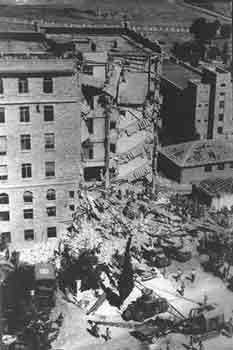On 22 July 1946, a Zionist underground organisation named the Irgun attacked the King David Hotel in Jerusalem. The terrorists, disguised as hotel staff, carried about 350kg of explosives into the basement of the hotel. The bombers chose the building because it was where the central offices of the British Mandatory authorities of Palestine were located, principally the Secretariat of the Government of Palestine and the headquarters of the British Armed Forces in Palestine and Transjordan. The hotel administration, the Palestine Post newspaper, and even the French Consulate received warnings that the attack was imminent but they all chose to ignore them.
The six-storey hotel opened in 1932, being the first modern luxury hotel in Jerusalem. It was built in an L-shape, with a long central axis connecting wings to the north and south. The hotel was in the centre of the city and was surrounded by gardens and an olive grove. The north side of the hotel housed the French Consulate and the south side, the offices of the British Palestinian Authority and headquarters. The basement housed the British military telephone exchange, and the annexes housed the military police and the Palestinian Police Criminal Investigation Department.
The explosion destroyed half the southern wing of the hotel. A total of 91 people were killed, including 41 Arabs, 17 Jews, and 28 Britons. The Irgun attack was meant to be retaliation for Operation Agatha - known in Israel as "Black Sabbath" - when the British Authority’s police and military arrested about 2,700 people in Jerusalem, Tel Aviv and Haifa in an attempt to put an end to the so-called state of anarchy which prevailed then and dismantle the Zionist underground.
The mastermind of the attack was the future prime minister of Israel, Menachem Begin. According to his testimony, the terrorists made three telephone warnings about the imminent bombing to avoid a large number of casualties, and the Palestine Post telephone operator who received the message immediately passed it on to the police. Only the French evacuated their employees. Begin often said how shocked he had been by the authorities' reluctance to evacuate people and by the number of casualties.
After the attack, the British carried out a new police operation against the Jewish underground: all major cities were raided and those who were identified by counter-intelligence forces were detained. Illegal immigrants were interned in camps, including children.
However, the attack did not change Britain’s stance toward the Anglo-American agreement on Palestine. In a letter dated 25 July 1946, Prime Minister Attlee wrote to American President Harry S Truman: “I am sure you will agree that the inhuman crime committed in Jerusalem on 22 July calls for the strongest action against terrorism but having regard to the sufferings of the innocent Jewish victims of Nazism this should not deter us from introducing a policy designed to bring peace to Palestine with the least possible delay.”
Source:
Rapoport, David C. “The Four Waves of Modern Terrorism.” In Attacking Terrorism: Elements of a Grand Strategy, edited by Audrey Kurth Cronin and James M. Ludes, 46-73. Washington, DC: Georgetown University Press, 2004.
























